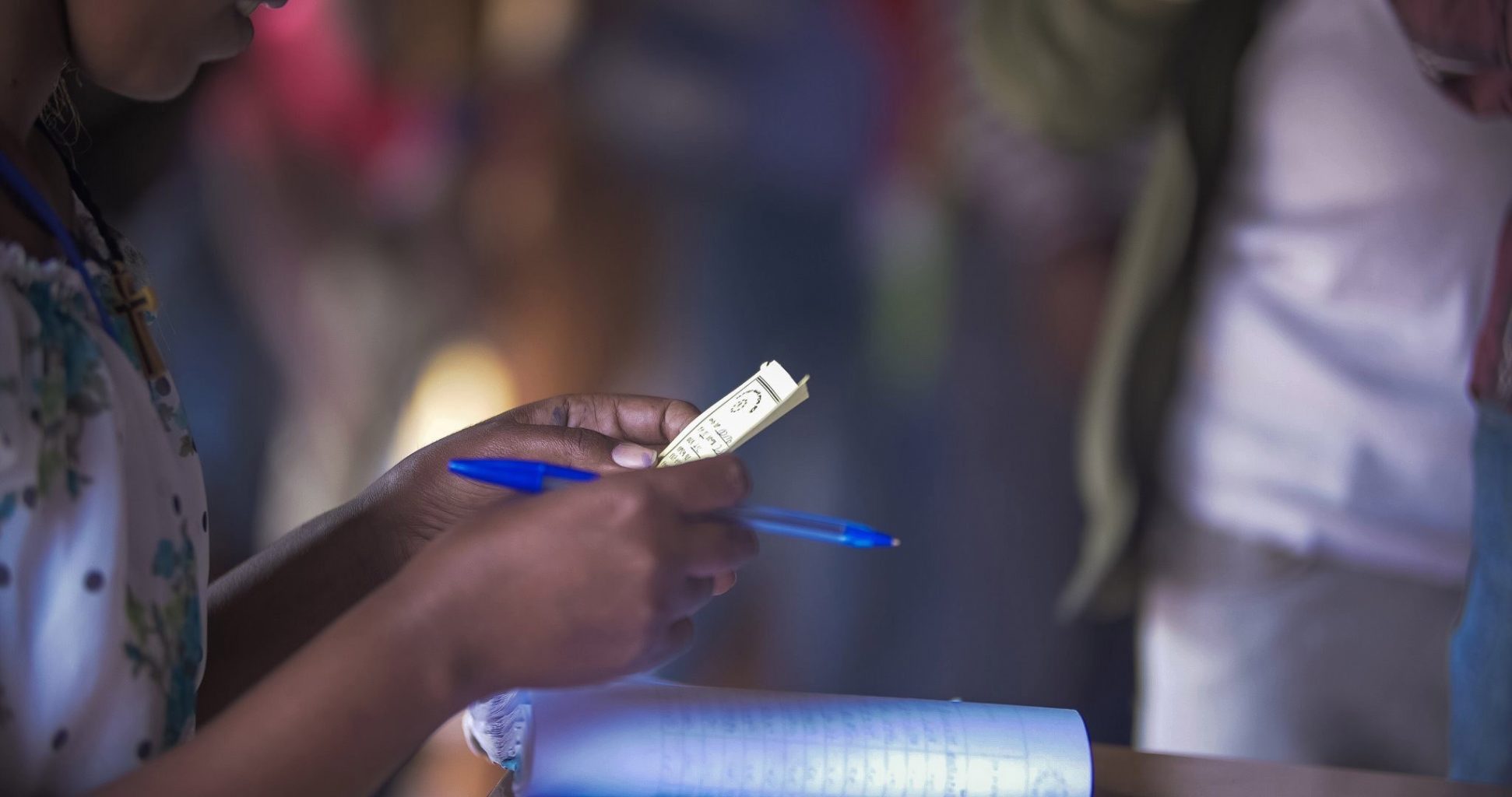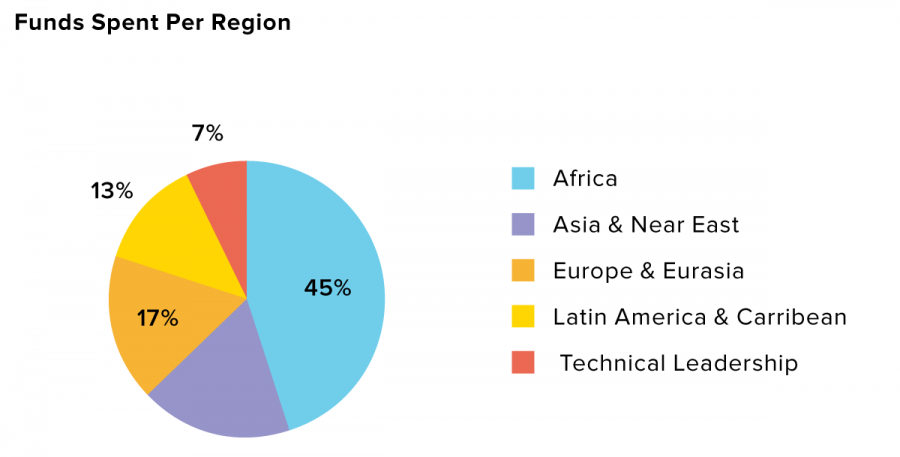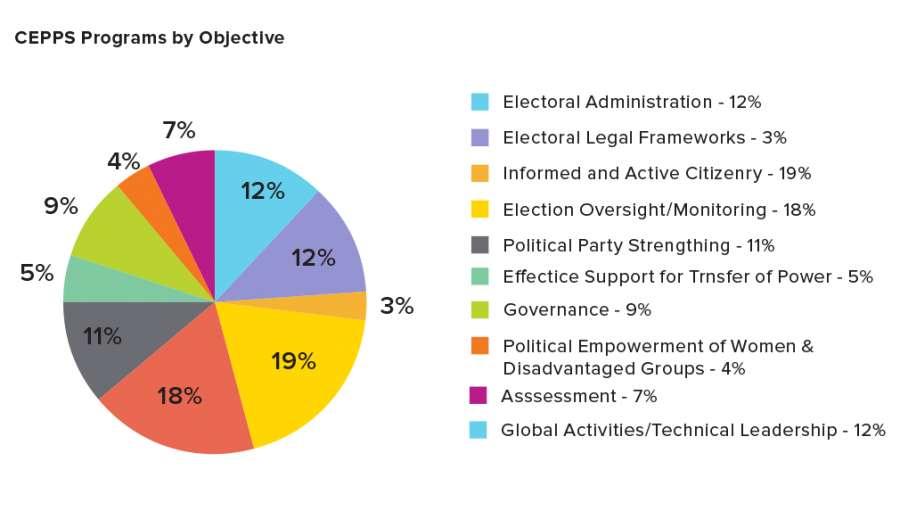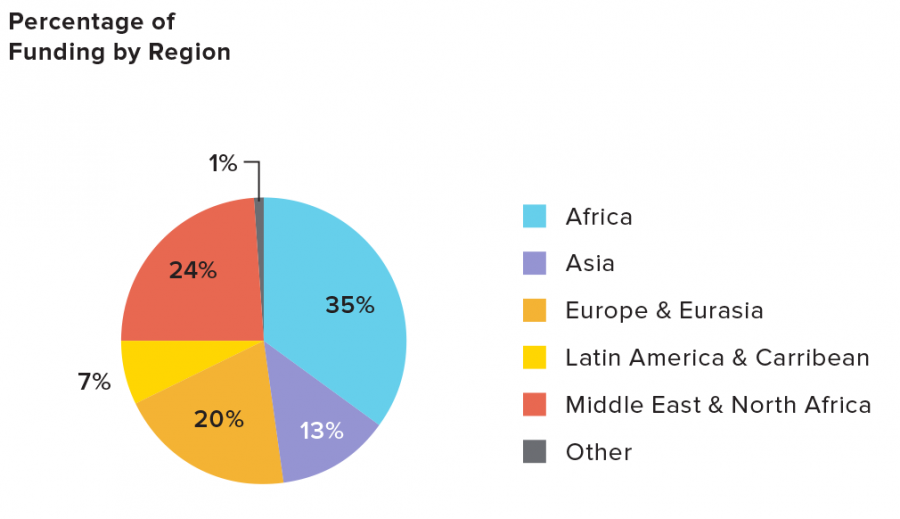
Take a look at how we provided support to elections and political transitions from 1995-2015.
1995-2003
What is this award?
In 1995, CEPPS was awarded a global cooperative agreement by USAID to provide election and political process assistance. The award gave USAID the unprecedented ability to support transitions and consolidations among democratic governments throughout the world by deploying CEPPS.
Key CEPPS I accomplishments
With this award, CEPPS implemented cost-effective election and political process programming in 61 countries to confront various democratic challenges. The consortium delivered technical assistance to election administrations, political parties, civil society organizations, and national and sub-national governments by drawing on a deep roster of international experts who could effectively respond to a variety of ever-changing political developments.
CEPPS also brought together democratic activists to enforce legitimate free and fair elections, as well as develop internal operational standards around elections.
By the numbers:
By the end of the cooperative agreement, the CEPPS partners implemented 298 electoral and political process programs in 61 countries with approximately $70 million in funding.

2001-2008
What is this award?
In 2001, CEPPS was competitively awarded a Leader with Associate (LWA) award by USAID to strengthen election and political processes globally. As the first leader with associate cooperative agreement focused on elections and political process strengthening, the award provided USAID missions the ability to issue direct, rapid associate awards to CEPPS to support transitions and consolidations among democratic governments throughout the world.
Key CEPPS II Accomplishments
CEPPS sought to respond to evolving challenges and worked to build democratic resilience at the country level through locally-driven, highly-contextualized strategies. In addition, CEPPS worked to sustain and reinforce these impacts through investments in regional and global networks and communities of practice, as well as through the development of international democratic norms and standards. Specifically, the consortium implemented rapid response, technical leadership and non-USAID presence country programming through the leader award, along with direct country programs through associate awards, in support of transitions to and consolidations of democratic governments throughout the world. Conducting programs in 82 countries, CEPPS’s programs:
Through the leader award, CEPPS implemented technical leadership and subgrant programs that worked to provide tools, develop international norms and standards and build networks around key areas of the political sector to better assist local partners and beneficiaries. In addition, CEPPS implemented programming from either USAID bureaus or missions around the world or Economic Support Funds from the Department of State and rapid response type activities. Specifically, CEPPS conducted 181 country and technical leadership programming, including $15 million in the Department of State’s Middle East Partnership Initiative (MEPI) programming in Lebanon, Tunisia, Morocco, Jordan, Bahrain, Algeria, Yemen, West Bank and Gaza, as well as regional programming. Through associate awards, CEPPS implemented 137 election and political process in 82 countries.
By the numbers
By the end of the global leader with associate cooperative agreement, CEPPS II implemented 318 electoral and political process programs, 181 programs under the Leader Award and 137 through associate awards, in 82 countries. The total funding for these programs was approximately $681,153,492, distributed between approximately $77,554,353 under the Leader Award and approximately $603,599,139 through associate awards.


2008-2015
What is this award?
In 2008, USAID competitively awarded CEPPS a global Leader with Associate (LWA) Cooperative Agreement to provide election and political process assistance.
Key CEPPS III Accomplishments
CEPPS sought to respond to evolving challenges and worked to build democratic resilience at the country level through locally-driven, highly-contextualized strategies. In addition, CEPPS worked to sustain and reinforce these impacts through investments in regional and global networks and communities of practice, as well as through the development of international democratic norms and standards. Through CEPPS III, CEPPS implemented 148 electoral and political process programs, 37 programs under the LWA award and 111 through associate awards.
Through associate awards, CEPPS worked in 65 countries in all regions of the globe, including three awards with a global reach. Programs ranged from short targeted assistance to long-term programming that addressed all aspects of the electoral and political cycle, with an average length of two and half years. Under the LWA award, CEPPS identified priority needs, as well as enhanced capacities to support and strengthen elections and political process activities worldwide, focusing programming on technical leadership, global field support, subgrants, and USAID and Department of State Priority Countries. The Technical Leadership and Global Field Support programs were designed to enhance the technical capacities and share best practices of promoting democracy organizations producing technical manuals and guides, as well as continuing to strengthen communities’ electoral practice and international standards. Through the long-term subgrants program, CEPPS worked to strengthen the capacities of local organizations to conduct election-related activities and provide technical assistance to other local organizations. Finally, CEPPS responded to rapidly changing needs on the ground through in-country programming deemed priorities by USAID and the Department of State.
By the numbers
By the end of the cooperative agreement, the CEPPS partners had implemented 148 electoral and political processes programs in 65 countries with funding totaling approximately $767 million. The total funding for these programs was approximately $767,108,218, distributed between approximately $18,285,902 under the Global Leader Award and approximately $748,822,316 through associate awards.

2015 – 2022
What is this award?
In 2015, CEPPS was competitively awarded the Global Elections and Political Transitions LWA. The award remained active until early 2022.
Key GEPT Activities
CEPPS’s approach to its GEPT work centered around building democratic resilience at the country level through locally driven, inclusive, highly contextualized strategies and a commitment to sustaining and reinforcing these impacts through investments in regional and global networks and communities of practice, as well as through the development of international democratic norms and standards. Throughout GEPT’s six-plus year period of performance, CEPPS carried out activities to support elections and political transitions amidst a challenging era for the advancement and preservation of democracy, rule of law, and human rights.
In total, under GEPT CEPPS implemented 25 rapid response projects. Due to CEPPS’s global footprint, rapid start-up capabilities, and long-standing relationships with key stakeholders, the consortium was able to quickly design and deliver rapid interventions that prevented democratic backsliding and supported democratic development, while addressing critical programming gaps in response to unanticipated and unpredictable events.
CEPPS also implemented a sub-grants program focused on promoting local sustainability, including providing targeted, specialized technical assistance to participating organizations and working with them to help increase their capacity to raise and manage funding from a variety of donors and partners. In total, CEPPS issued 20 sub-grants under this program component.
Finally, technical leadership projects provided innovative research, analysis, and tools to support inclusive democratic development on a global scale. CEPPS developed 16 technical leadership projects in conjunction with local partners from around the world.